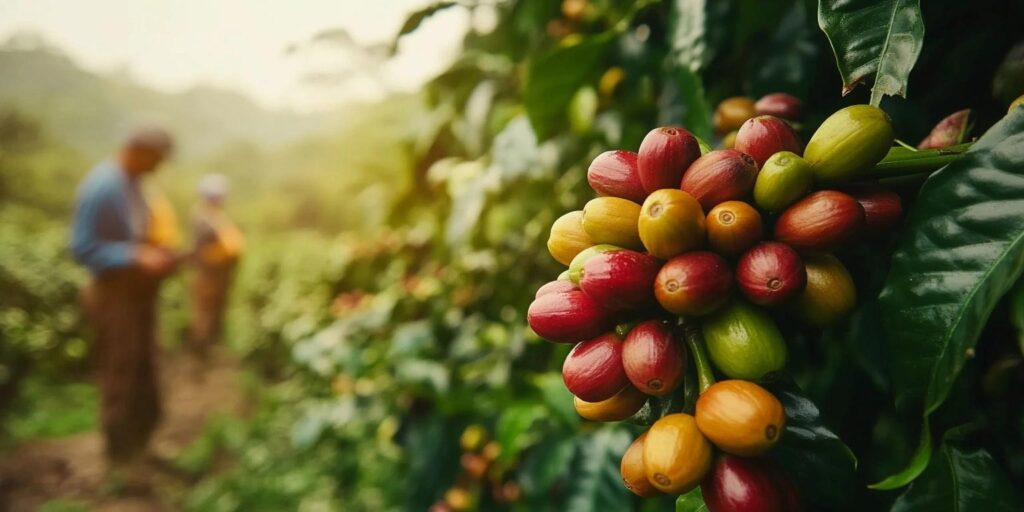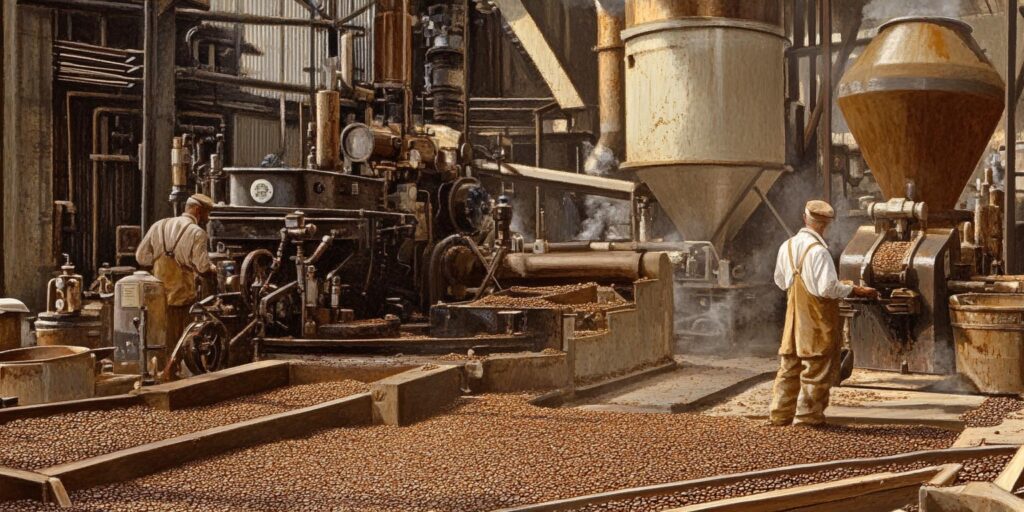
En los últimos años, el procesamiento del café ha experimentado importantes avances tecnológicos.
Estas innovaciones comienzan desde el nivel agrícola, donde los agricultores utilizan sensores avanzados y análisis de datos para monitorear la salud de las plantas de café. La agricultura de precisión permite rastrear factores clave como la humedad del suelo, los niveles de nutrientes y el estado general de las plantas. Además, las técnicas modernas de procesamiento en húmedo y seco han evolucionado, reduciendo el consumo de agua y mejorando la consistencia de los granos. Estas tecnologías ayudan a producir café de mayor calidad mientras se minimiza el impacto ambiental.
Mejoras recientes en los productos de café
La tecnología ha desempeñado un papel clave en la mejora de la calidad y la sostenibilidad de los productos de café. Una innovación destacada es el uso de inteligencia artificial (IA) para monitorear la temperatura, la humedad y las condiciones del suelo en los cultivos de café. La IA ayuda a los agricultores a tomar decisiones en tiempo real, lo que lleva a cultivos más saludables y a un café con mejor sabor. Además, han surgido opciones de empaque sostenible, como materiales biodegradables o compostables, lo que permite a las empresas reducir su huella ambiental mientras mantienen la frescura del producto. Estas innovaciones aseguran que el café llegue al consumidor en condiciones óptimas.
Nuevas innovaciones en la industria del café:
- Avances en cold brew, incluyendo máquinas de preparación más rápida.
- Café de calidad de lujo gracias a tecnologías de tostado y preparación de precisión.
- Aplicaciones móviles que mejoran la experiencia de compra y personalización en cafeterías.
- Monitoreo con IA de plantas de café para mejorar la salud del cultivo y la calidad del producto.
- Empaques biodegradables y compostables para un futuro sostenible.
- Nuevos sistemas de secado de café con energía solar y alta eficiencia energética.

Nuevas tecnologías para el secado del café
El secado de los granos de café es una etapa crítica en la cadena de procesamiento, y se han desarrollado nuevas tecnologías para optimizar este proceso. Máquinas de secado impulsadas por energía solar y sistemas mecánicos de bajo consumo energético han surgido como alternativas sostenibles a los métodos tradicionales. Estas innovaciones proporcionan condiciones de secado más consistentes, lo que se traduce en granos con mejor sabor. Además, algunas tecnologías utilizan radiación infrarroja o secado al vacío para reducir los niveles de humedad de manera más eficiente, preservando el sabor mientras se acelera el proceso.
Avances en cold brew
El café cold brew, antes considerado un producto de nicho, ha crecido en popularidad gracias a las innovaciones en la tecnología de preparación. Nuevas máquinas de cold brew permiten tiempos de preparación más rápidos mientras mantienen el sabor suave y de baja acidez que caracteriza a esta bebida. Algunos sistemas pueden preparar café frío en solo minutos, en comparación con el proceso tradicional de infusión que toma horas. Estos avances han hecho que el cold brew sea más accesible tanto para cafeterías como para consumidores que buscan su dosis de café frío en menos tiempo.
Café de calidad de lujo
La demanda de café de alta gama ha impulsado el desarrollo de nuevas tecnologías de tostado y preparación que realzan el sabor y el aroma de los granos premium. Por ejemplo, las máquinas de café inteligentes ahora pueden ajustar parámetros como la temperatura del agua y el tiempo de preparación según el tipo específico de grano, garantizando una taza perfecta en cada ocasión. Además, la producción de café en micro lotes ha ganado popularidad, permitiendo a los consumidores disfrutar de sabores únicos provenientes de pequeñas cosechas cuidadosamente procesadas para obtener la mejor calidad.
Aplicaciones móviles y tecnología en cafeterías
La tecnología móvil ha transformado la forma en que las personas interactúan con las cafeterías. Muchos cafés ahora ofrecen aplicaciones que permiten a los clientes hacer pedidos anticipados, personalizar sus bebidas y acumular recompensas. Estas apps agilizan la experiencia de compra, haciéndola más rápida y conveniente para el consumidor. Además, algunas aplicaciones ofrecen recomendaciones personalizadas según las preferencias del usuario, mejorando la satisfacción del cliente. Esta integración de la tecnología en la experiencia del café asegura beneficios tanto para los cafés como para sus clientes mediante un proceso más fluido y eficiente.
